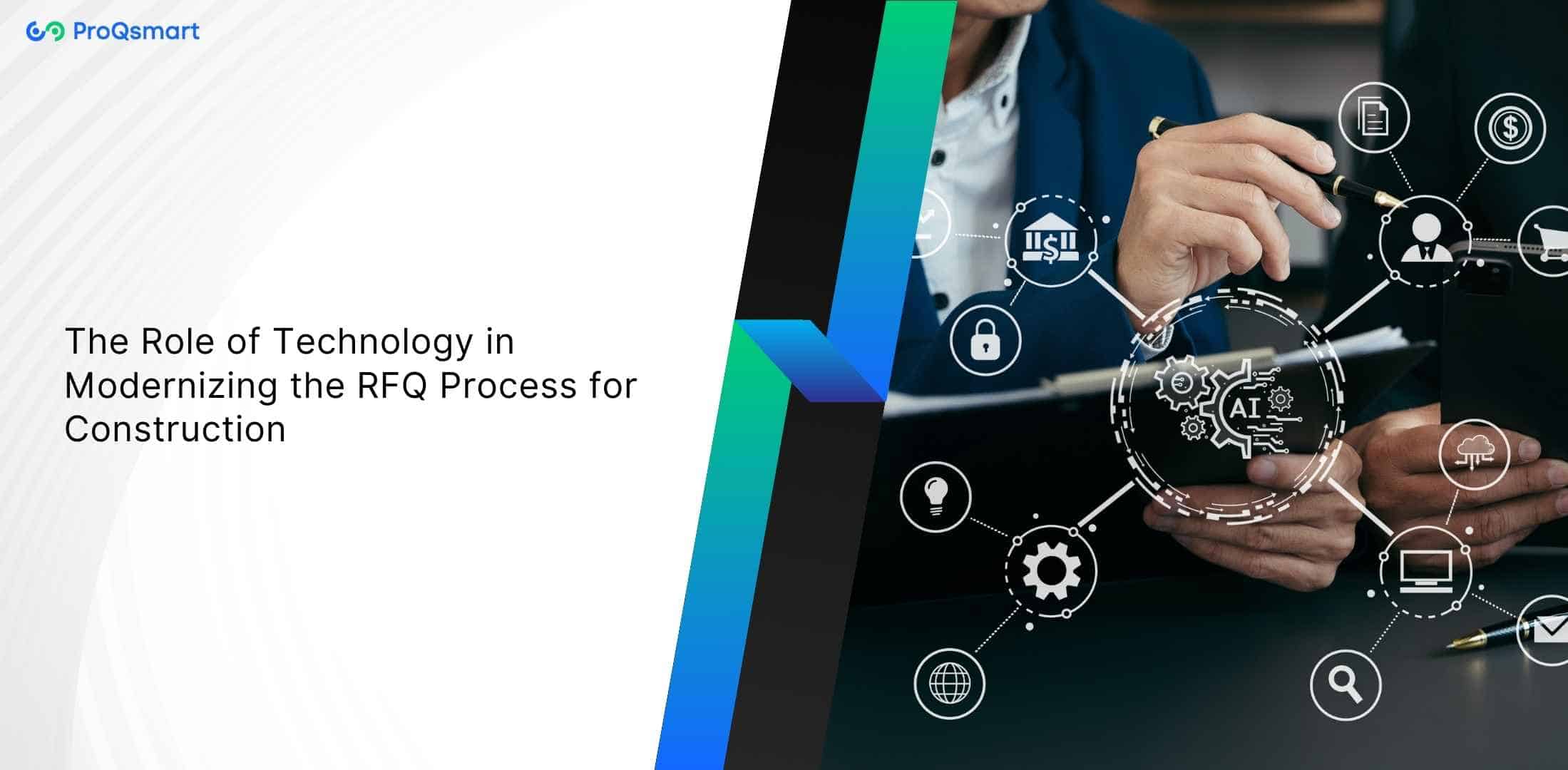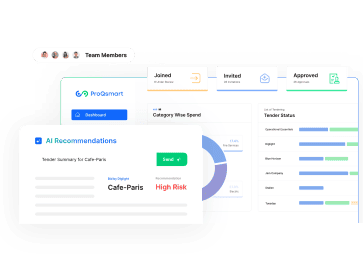Modernizing the RFQ process in construction isn’t just cool; it’s required. You simplify, speed up processes, and make things more accurate with new tech.
It is like a busy construction site—now picture that organized with digital solutions. Tech simplifies requests, organizes responses, and eliminates the legacy paper grind.
You save time and money, plus you get insights that change planning. Digital RFQ tools are bringing clarity and efficiency to the mix and pushing the industry forward.
We’re talking about a future where RFQ management is seamless, intuitive, and smart. You won’t be following behind with outdated practices; you’ll end up leading with innovative ones.
Accepting this change means accepting growth and success. Not only do you keep up, but you set the pace. Dive in and charge up that hill.
Key Takeaways
- An RFQ, or request for quotation, is a solicitation of suppliers to share pricing information. It also plays a critical role in the procurement process.
- The RFQ process begins with defining your requirements. Then, you send requests to suppliers, receive their bids, and choose the best offer based on price and terms.
- RFQs are typically used when the requirements are well-defined. This clarity lets buyers evaluate suppliers primarily on cost.
- Digitalizing RFQ processes helps streamline operations and reduce errors. It also increases efficiency by automating and managing the flow of information, made possible through leveraging technology.
- Technology drives the RFQ process by providing platforms that enhance communication and data analysis. This innovation allows for real-time tracking that enables more informed decision-making.
- The future of RFQs in the construction industry points to a move towards integrated digital solutions. These capabilities will improve collaboration and transparency in sourcing and procurement.
What is an RFQ?
An RFQ, or Request for Quote, is a critical tool used in the procurement process. Let’s dive into how it works and why it matters. The company sends a formal document to potential vendors, asking for price quotes on certain products or services. This approach allows businesses to shop around for deals, ensuring that their purchases align with their needs and budget.
It’s not only about asking for prices. Collecting rich pricing and specifications from vendors gives companies significant purchasing power. This ability to compare offers enhances decision-making and helps businesses secure the best possible deals.
Definition of RFQ

RFQ is short for “request for quote,” and it typically comes into play when a business knows precisely what it requires. When a company needs specific machinery, it sends out a Request for Quotation (RFQ). This helps collect quotes from different suppliers who can provide the needed equipment.
The RFQ is designed to gather specific information, such as pricing, payment terms, and product details. This makes it an excellent option for businesses with specific items they’re looking to buy, ensuring there are no surprises. A well-structured RFQ ensures each supplier submits the same information, making it easy to compare their offerings side by side.
Purpose of RFQ
The main purpose of an RFQ is to compare offers from different vendors. This allows businesses to make smart purchase decisions. It’s similar to comparison shopping for a new phone. By asking providers for competitive pricing, RFQs enable businesses to better control their budgets.
If you are in charge of a small tech startup, exploiting RFQs can save you from overspending on gear. This process also speeds up decision-making in procurement because it accelerates how quotes are collected and assessed. The clearer the RFQ, the faster you can make a decision on which vendor to choose.
Importance in Construction
In construction, RFQs play a crucial role in controlling costs and timelines. As you oversee a large construction project, RFQs help you secure the best rates for materials and services, keeping your budget on track. They also assist in selecting the right contractors for specific jobs.
For instance, if you require a contractor who specializes in green building, an RFQ will help narrow down your options. This targeted approach leads you to the right contractor for your project. An effective RFQ process can make or break the project, ensuring resources are allocated efficiently and everything stays within planned timelines, which is vital for the project’s success.
How RFQ Works
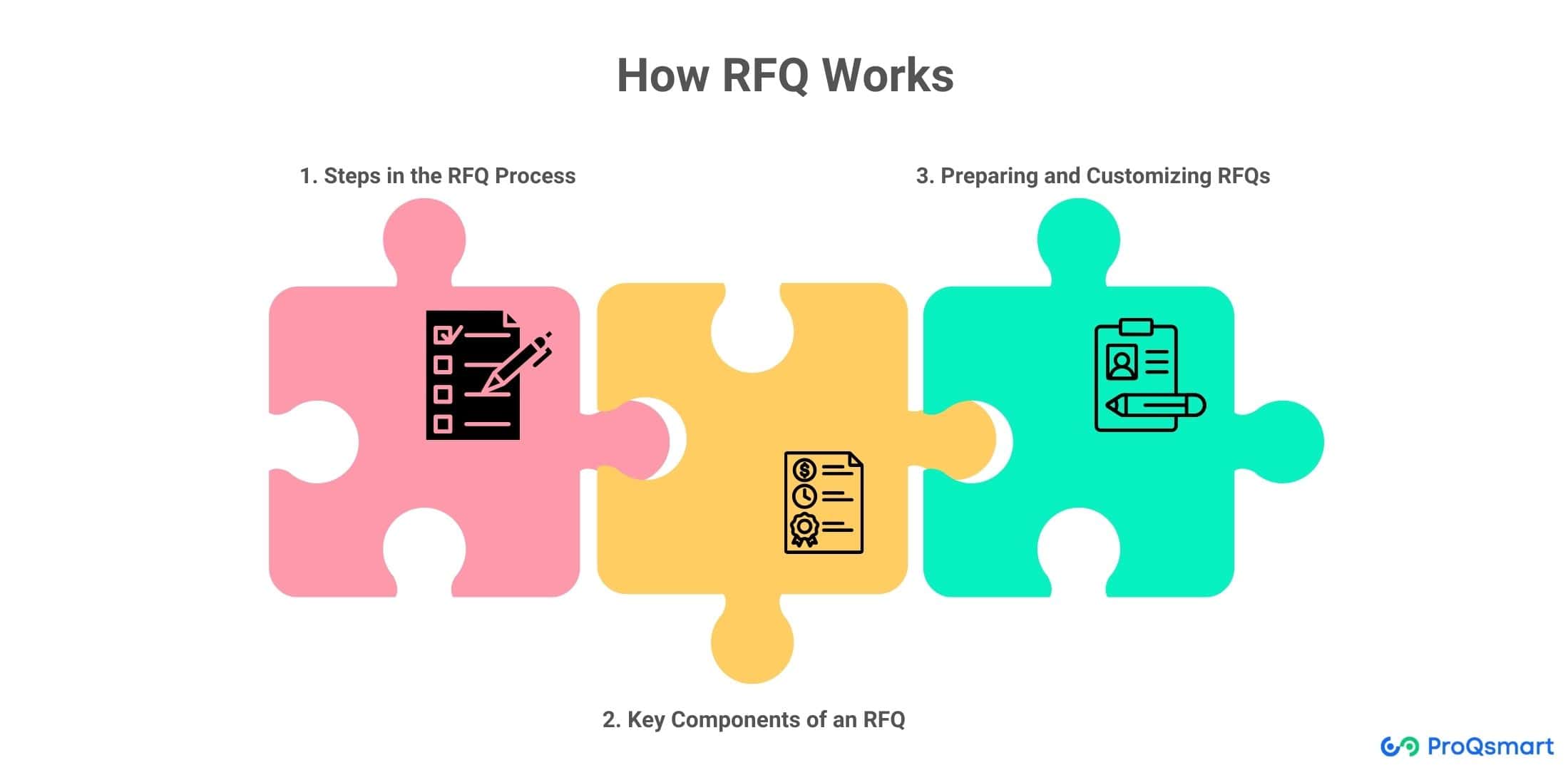
While the effective RFQ process may sound complicated, it’s much easier than you think. By understanding the steps and what to expect, including the use of an RFQ template, you can move forward with confidence in the bidding and procurement process.
1. Steps in the RFQ Process
The RFQ process typically consists of a series of clear steps. First, it includes drafting the RFQ document itself, which should be detailed and clear. It’s essential to outline exactly what your project requires and how vendors should respond.
Then you’ll send this document to selected vendors. Pick no more than eight vendors if you want to keep it manageable. Important throughout this process is to set clear deadlines. It tells vendors when to submit their responses, keeping the process seamless and on time.
Once responses start trickling in, you enter the evaluation phase. Here, you’ll compare vendor submissions to predefined standards. This is where those detailed specs you included pay off, as they guide the evaluation.
Remember that price drives approximately 80% of RFQs. Don’t forget to focus on all of the others, too. Finally, you give the contract to the vendor that fits your specifications and offers the most bang for your buck.
2. Key Components of an RFQ
To write a complete RFQ, there are some elements that must be added. Specifications are the backbone of your RFQ, letting vendors know exactly what you expect. Payment terms are a key component as well, so everyone knows how and when payments will be made.
Clarity on this point is important to avoid misunderstandings later. Sprinkle in some company backstory as well. It also allows vendors to customize their proposals in a way that’s more aligned with what you need.
Providing this context can make a huge difference in the quality of responses you receive. It makes sense to have three to four client testimonials close by. These testimonials help establish your credibility and can also help influence vendor interest.
3. Preparing and Customizing RFQs
When preparing RFQs, a checklist can keep you on track. Begin by selecting potential vendors, and then align the RFQ with your specific project requirements. Tailoring the RFQ to suit your needs makes it more relevant.
This approach greatly increases your chances of receiving proposals that hit the mark. Another great tip is utilizing procurement software. This can streamline the creation and management of RFQs, saving you time and reducing errors.
Having two to three years of your company’s financial data on hand gives vendors a place to start. This tells them you are stable and makes them think there is potential for future partnerships.
When to Use an RFQ
The Request for Quotations (RFQ) plays an important role in procurement. It helps you aggregate detailed pricing information once you have an exact idea of what you need to purchase. This way, you can shop around to find a lower price from another vendor. You can find the absolute best value for your budget!
RFQs are typically used for purchases under $100,000. This works particularly well in industries such as construction and manufacturing where price is important.
1. Ideal Scenarios for RFQs
When you’re buying large quantities of a product or need standardized services, effective RFQs are ideal. Whether you’re seeking office supplies in bulk or contracting for routine maintenance services, an RFQ template makes it easy. They allow you to focus on price and delivery conditions while ensuring that you receive competitive bids from qualified contractors.
Sometimes, it’s not about price at all. Maybe you require a vendor with specific qualifications or functionality. By customizing RFQs to meet your sourcing requirements, you can ensure that vendors align with your specific needs, ultimately leading to a successful project.
Transparency and fairness are paramount in public sector projects. RFQs help establish an open and fair bidding process, enabling clear comparisons between vendors and fostering integrity and inclusivity in procurement practices.
2. Comparing RFQ and RFP
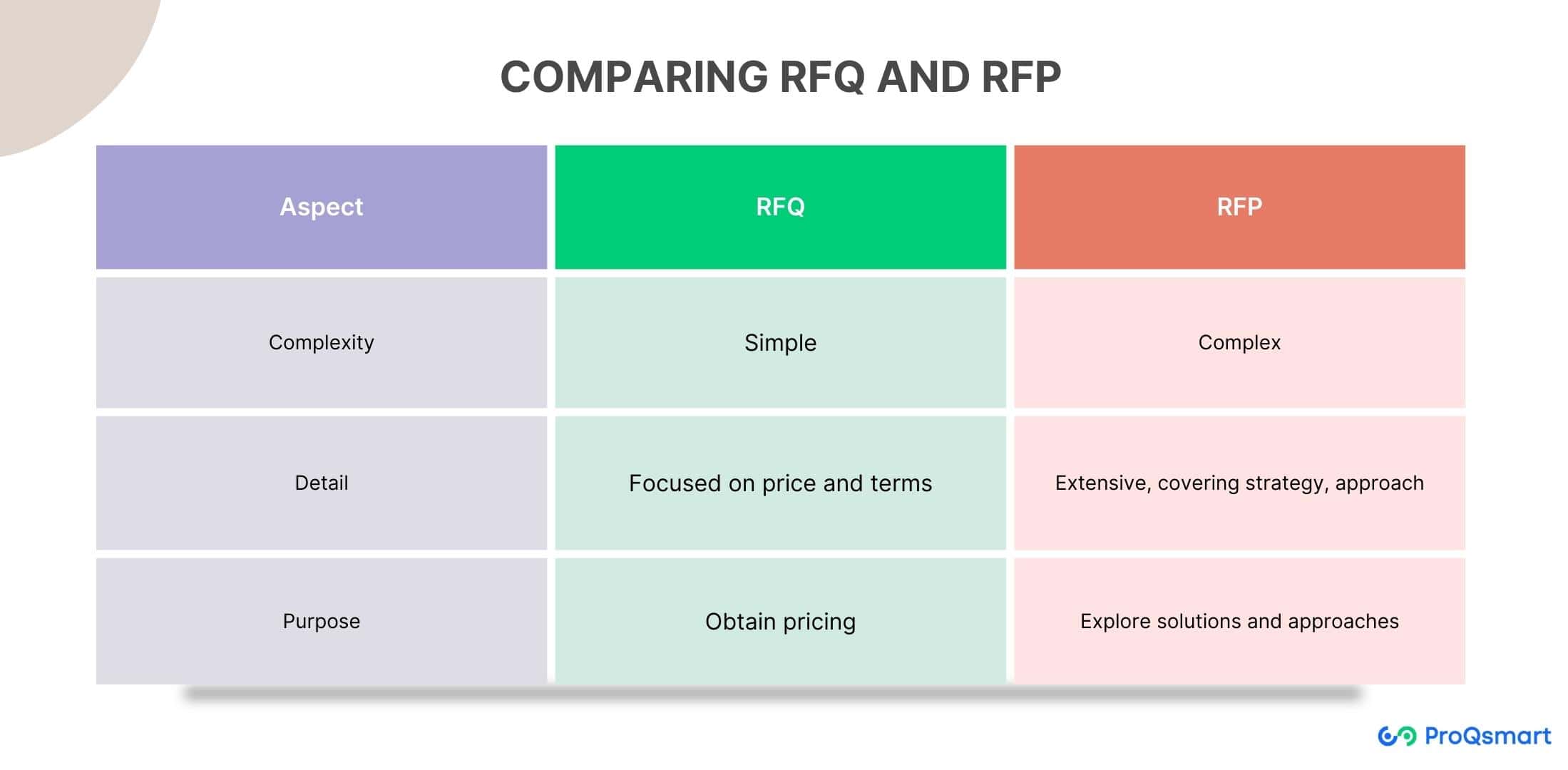
RFQs and RFPs serve different purposes. RFQs are straightforward, addressing the price and specific vendor qualifications. RFPs are more in-depth, asking vendors to provide more holistic solutions and strategies.
Aspect | RFQ | RFP |
Complexity | Simple | Complex |
Detail | Focused on price and terms | Extensive, covering strategy, approach |
Purpose | Obtain pricing | Explore solutions and approaches |
These differences will help you match your procurement approach to your project’s requirements and goals. The decision of which option to choose can vastly influence your procurement strategy. It will impact how you work with vendors and the solutions they provide.
3. Choosing Between RFQ and RFP
Deciding between an RFQ and an RFP isn’t always straightforward, but there’s a simple guide. If your project is simple, with established specifications and a tight timeframe for vendor responses, choose an RFQ. If your project is more complex, ask vendors for detailed proposals. In that case, an RFP is the way to go.
There are a few different factors that play into this decision. These range from project complexity to the level of vendor involvement sought after to overall business goals. Align your procurement method along these factors and you’ll meet your project requirements. It also creates a competitive and fair process for each vendor.
Benefits of Digitalizing RFQ
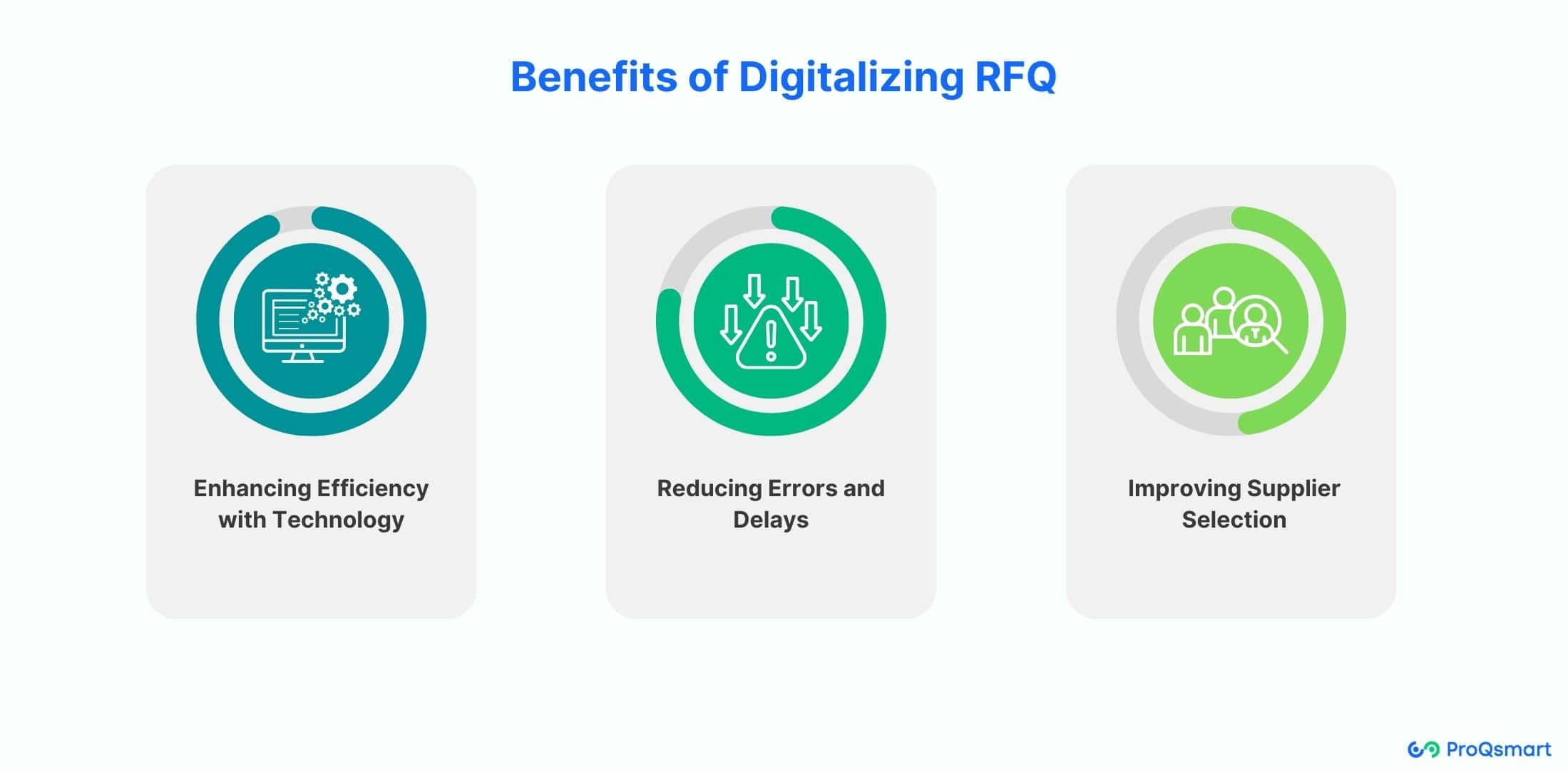
The old-school Request for Quotation (RFQ) process is slow and painful, often getting bogged down with hiccups along the way. However, utilizing an effective RFQ template can streamline the procurement team’s efforts, making the sourcing process more efficient. Digital tools? They make things spicy, enhancing the overall bidding experience.
Enhancing Efficiency with Technology
One of the cool things about tech is how it makes life easier, especially in the context of an effective RFQ process. Cloud-based platforms, for instance, are the superheroes of RFQ processes. They securely store all of the data, allowing you to access it anytime and from anywhere, which is a significant advantage when managing complex sourcing requirements.
That’s where automation comes in to speed up the RFQ lifecycle. Imagine this: no more drowning in paperwork or spending hours on manual entries. Automated systems streamline the RFQ template process, doing the heavy lifting for you. This lightens your administrative burden and lets you focus on critical tasks like contract negotiation and bid selection.
Plus, easy-to-use interfaces make it easier for potential suppliers to engage and interact. They receive the pricing information they need faster, leading to smoother transactions. The ease of use is what keeps everyone on the same page, ensuring an efficient bidding process.
Reducing Errors and Delays
Manual errors … ugh. Digital RFQ solutions specifically tackle this. They cut down on those annoying mistakes that can be made with manual processes. Real-time updates are another game changer. They reduce delays by making sure everyone’s on the same page.
When updates come immediately, the procurement cycle moves more quickly. Of course, the power of one system. Having all of that data in one place makes tracking RFQ submissions and responses so easy. This centralization ensures that nothing gets lost in the shuffle and everyone knows exactly where things stand.
Improving Supplier Selection
Choosing the right supplier is of utmost importance. With digital tools, you can get a precise assessment of supplier performance and capabilities. It’s a magnifying glass to see who really walks the walk and who can talk the talk.
Data analytics play a huge role here. They help us make decisions by crunching numbers and displaying clear insights. That means you’re not shooting from the hip – you’re making intelligent, evidence-based decisions.
Digital platforms also make chatting with potential vendors a whole lot easier. Communication flows better, misunderstandings shrink, and you can build stronger relationships. Ultimately, it’s about creating a win-win for everybody.
Role of Technology in RFQ
Technology has changed how we do the Request for Quotation (RFQ) process. Gone are the days of manually managing quotes with mountains of paperwork and endless email threads. Now, with digital RFQ platforms, procurement processes are more efficient.
These platforms simplify operations by cutting costs and enhancing supplier relations. Picture this: instead of juggling multiple spreadsheets, you’ve got one unified system where everything clicks. This shift optimizes workflows and boosts security with encryption and secure access. As a result, sensitive data remains protected.
Streamlining the RFQ Process
When it comes to streamlining, RFQ management software offers features specifically built to make this part of the procurement process easier. Imagine you have a centralized hub where you can track all RFQ-related activities.
Having one unified platform means that procurement teams can easily access historical RFQ data, supplier metrics, and past contract terms. It’s like a digital assistant that keeps everything in order. Seamless data flow is a must. It means your information glides smoothly through systems, making everything more efficient.
Think about it: with data flowing freely, you spend less time on manual tasks and more on making strategic decisions.
Optimizing Data Management
Data management systems help organize and analyze RFQ information. They make sure records are accurate and readily accessible for future audits.
Think of having a clean database as a hygiene factor. Better forecasting and planning can help you anticipate market trends and adjust your strategies accordingly. With the right data management, you can make deliberate decisions that help you achieve your organizational objectives.
It’s about the right data at the right time, which makes it all the easier to navigate complex procurement landscapes.
Utilizing Construction Technology Solutions
Construction technology tools can significantly enhance RFQ management. Think of tools like Building Information Modeling (BIM) or project management software that integrate seamlessly with RFQ platforms.
This integration ensures that project requirements and expectations are clearly communicated, reducing the risk of misunderstandings. By front-loading expectations, digital RFQ platforms help mitigate downstream project risks.
Consider case studies where technology has led to successful RFQ processes. These examples show how integrating RFQ platforms with existing tools like ERP systems or SAP can lead to procurement excellence.
Vendors often evaluate many RFPs but respond to only a few. Crafting a compelling RFQ, therefore, is essential, making technology’s role in enhancing clarity even more vital.
Future of RFQ in Construction
In the fast-paced construction environment, the RFQ process is undergoing considerable transformation, particularly with the introduction of an effective RFQ template. Understanding the emerging trends and technologies that are reshaping RFQ management is crucial, especially in how we approach procurement for construction and engage with potential suppliers.
Trends in RFQ Management
One of the biggest trends is a major shift to digital platforms. Companies have been adopting online RFQ processes at a dizzying pace since the COVID-19 pandemic. This shift has made it much easier for them to manage and issue RFQs.
This digital transition isn’t simply about abandoning paper; it’s about facilitating smarter procurement routes. For example, many construction firms now handle RFQs for even the smallest projects online. This approach is helping operations manage much more work efficiently.
Another key trend is the emphasis on sustainability and ethical sourcing. As companies become increasingly aware of their environmental impact, they incorporate these principles into their RFQ processes. This translates to more in-depth evaluations of suppliers, prioritizing those who are sustainable.
It’s not just about price anymore; it’s about responsible sourcing. Data security and privacy are also coming to the fore. As RFQ processes become more digital, safeguarding sensitive information is essential. Firms are investing in strong security systems to protect data, ensuring that vendor and project information remains private.
Innovations in Construction Technology
We’re seeing exciting innovations in the construction space that impact the RFQ process. New technologies, such as AI and machine learning, help accelerate and analyze vendor responses, making the creation of an effective RFQ much easier. These tools sift through massive amounts of data at breakneck speed, offering insights that would take an eternity to compile by hand.
The Internet of Things (IoT) and big data are also improving supplier engagement. For example, IoT devices can track and report real-time data on supplies, which can be crucial during the construction RFQ template process. This data-driven approach leads to smarter decision-making and more effective supply chain management.
Mobile technology is another game changer. With smartphones and tablets, RFQs can now be managed on the go, making the process more flexible and responsive. This mobility allows stakeholders to access RFQs anytime and anywhere, which is essential in the rapid-paced construction setting for taking immediate action.
Evolving Practices and Standards
RFQ practices are evolving to meet modern procurement demands, especially in the construction industry where an effective RFQ strategy is crucial. The industry is moving toward more collaborative RFQ strategies that emphasize relationships with vendors and suppliers, facilitating better communication and collaboration essential for successful projects.
Following industry standards in RFQ documentation is increasingly important. Utilizing a construction RFQ template ensures that all requirements are clear to everyone involved, minimizing misunderstandings and errors during the bidding process.
Continuous improvement is key in refining RFQ processes. Companies are focusing more on feedback loops and iterative processes. This focus enables them to adapt and optimize their RFQ strategies over time, ensuring that procurement practices stay relevant and effective in an industry that’s constantly changing.
Final Remarks
You’ve got the scoop on RFQs. It’s really about quoting out there. You need them to get the best deals. Think of it like shopping around for the best price on a new phone. Easy, right?
Using tech with RFQs makes life easier. It speeds things up and cuts mistakes. Just imagine not having to dig through piles of papers. You get your quotes faster, and you can concentrate on building stuff.
RFQs will continue to evolve. Tech will make them even better. Expect things like AI to step in and lend a hand shortly. It’s going to be a game changer in construction.
Why not jump in and start using RFQs today? You’ll save time and money. Who doesn’t want that? Think ahead and see what you can do with a little thing like an RFQ.

